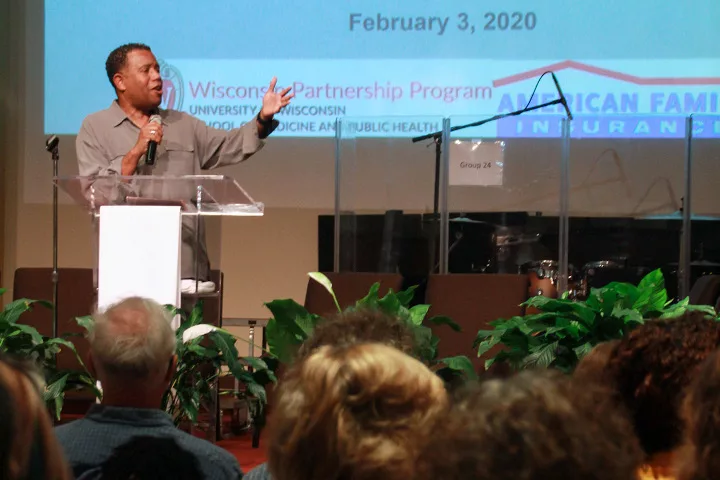Christopher ‘Rufus’ Sweeney Thinks Outside the Box in His Training and Career
Sweeney, known as a creative soul and prolific idea generator, says he inherited his entrepreneurial spirit from his paternal grandfather.
Hope and healing. These are top of mind for Rev. Alexander Gee, DMin, as he embarks on his work to address how the chronic stress of microaggressions experienced by Black people influences their health and well-being.
Gee is the founder and president of the Nehemiah Center for Urban Leadership Development. The center is using a Community Impact Grant from the University of Wisconsin School of Medicine and Public Health’s (SMPH) Wisconsin Partnership Program (WPP) to improve health within the African American community, where chronic stress contributes to shorter life expectancies and higher rates of disease, and where infant mortality rates among Black mothers are two to three times higher than white mothers. The awardee’s approach to addressing the chronic stress caused by systemic racism is two-fold. It seeks to build leadership and social connection among emerging Black leaders; and it teaches a history course to educate white people on the roots of racism and its ongoing impact on the health of their Black colleagues, friends and neighbors.

“Black people are dying from chronic stress,” says Gee. “When we understand how this stress makes us prone to illness — from COVID-19 to dementia — it is only then that we can change it.” Through its grant programs, the Wisconsin Partnership Program is striving to catalyze this change.
The Wisconsin Partnership Program’s commitment to addressing systemic, avoidable and unjust conditions that impact health is reflected in many grant programs and collaborations across the program’s pillars: community partnerships, research and education. To date, the program has awarded nearly $36 million for initiatives and projects designed to advance health equity.
“The Wisconsin Partnership Program’s approach to grant making and community-academic partnerships continues to evolve to reflect the latest understanding of what creates health, based on cutting edge National Institutes of Health scientific approaches,” says Amy Kind, MD ’01, PhD ’11 (PG ’05, ’07), chair of the program’s Oversight and Advisory Committee. “Though addressing health disparities has been at the core of our mission since the program’s inception, a more explicit focus on health equity and the social determinants of health — including the impact of racism — ensures that our investments will have a great impact on health and well-being over the course of a lifetime.”
Since 2015, the Wisconsin Partnership Program has awarded more than $30 million in community grants to advance health equity and address social determinants of health. Awards support health-improvement initiatives led by rural and urban communities across Wisconsin, including in communities of color, such as Wisconsin’s Hispanic, Native American and African American populations.
The grant to Nehemiah expands its Black History for a New Day course, which teaches African American history in the context of U.S. history to help white people understand structural and institutional racism and how certain practices, behaviors and environments exacerbate the stress African Americans experience. To date, more than 1,000 people from the Madison area have attended the nine-week course.
The center’s leadership institute provides culturally relevant coaching that builds leadership skills, and networking and entrepreneurial opportunities for young African American professionals. These opportunities strengthen their ability to process the stress and anxiety caused by microaggressions they experience. More than 40 young Black leaders have participated in the program thus far. The grant team also has developed new partnerships with school districts, faith communities and businesses to provide coaching and training related to equity and inclusion goals. The results of these engagement and education efforts will inform how policy makers, employers, health care providers, public leaders and others view their work, and will help Black individuals and families survive, achieve health and succeed in Madison.
The health of Wisconsin’s rural communities is affected by inequities, as well. In addition to health disparities influenced by access to health care and coverage, the community of farmers faces significant health challenges. Though stoic and unwavering in their commitment to their farms and families, these individuals experience chronic stress, social isolation and economic hardships that adversely affect their health and well-being. The current suicide rate for farmers is more than two and a half times that of the general public.
Chris Frakes, PhD, program director of Farm Well Suicide Prevention Project at the Southwest Wisconsin Community Action Program and leader of a Wisconsin Partnership Program grant aimed at preventing suicide among farmers in southwest Wisconsin, says this population often doesn’t prioritize their health and well-being.
“There are cultural barriers that impede farmers’ ability to have the same opportunities to lead healthy lives,” says Frakes, adding that they might joke about “putting duct tape on a broken finger,” but the reality is they often don’t seek support for physical or mental health problems — and mental health challenges continue to grow amid economic burdens and the generational pressure farmers feel to carry on their family farms.

However, Frakes also notes a shift in openness among farmers who are seeking support for themselves and fellow farmers. The grant team is harnessing this shift to change the narrative around farmer suicide and mental health. They are developing outreach strategies that are led by and for farmers; providing community education and training to improve responses to mental health crises; and partnering with local primary care providers and medical students to improve depression assessments and training specific to caring for farmers.
“Supporting the health of farmers is a broad societal issue, as well,” explains Frakes. “The health of our farming community impacts our access to food and, ultimately, influences everyone’s health and well-being.”
In addition to its investments in community partnerships, the Wisconsin Partnership Program supports nearly $3 million in grants that incorporate a health equity approach to research, including projects to improve health care delivery for vulnerable communities.
Kara Hoppe, DO, MS ’19, an assistant professor in the SMPH Department of Obstetrics and Gynecology, is using one such grant to improve postpartum care for Black women. Hoppe; Tia Murray, co-founder of Harambee Village, a community-based program that provides pregnancy, birth and lactation support to mothers and families in south-central Wisconsin; and Susan Passmore, PhD, assistant director of the Center for Collaborative Health Equity at the SMPH, are working with Harambee doulas to expand a successful home telehealth/remote patient-monitoring program for postpartum hypertension. Their goal is to improve the health of new Black mothers by providing an all-inclusive approach to addressing their postpartum needs.
The project recognizes that the chronic stress that many Black women experience over their lifetime — stemming from discrimination and bias — is a significant driver of poor birth outcomes among Black mothers and babies. Additional socioeconomic conditions, such as housing or income instability, can further exacerbate chronic diseases and health conditions, putting new Black mothers at heightened risk for complications after childbirth.
According to Murray, the partnership with Harambee reflects the crucial role doulas play in building trust between patients and providers because they understand the challenges and lived experiences of Black mothers.
“Increasing access to quality postpartum care that’s delivered in an environment based on trust and community connection will have direct health benefits for the mothers, their infants and entire families, ” says Hoppe.
Health equity also is infused into education initiatives supported by the Wisconsin Partnership Program. More than $3 million is directed specifically toward health equity topics and issues within curriculum and education programs.
The recently established Wisconsin Partnership Program Scholarship — a four-year scholarship created with the goal of increasing the SMPH’s enrollment of medical students from communities that have been historically underrepresented in medicine. Funds are provided to two or more medical students matriculating at the SMPH, for up to $40,000 per year.
“Our hope is that the scholarship program will enhance the recruitment and retention of medical students from underrepresented communities, and in doing so, will help create and sustain a physician workforce that reflects Wisconsin’s diverse population,” says Jonathan Temte, MD ’87, PhD (PG ’93), associate dean for public health and community engagement and a professor in the Department of Family Medicine and Community Health.
The first two scholarships were awarded in February 2020 to two students who identify as Native American and participated in a pipeline program at the SMPH.
In October 2020, the Wisconsin Partnership Program announced its sixth round of Community Impact Grants, awarding $6 million in grants for community-academic partnerships that aim to advance health equity and address the root causes of health inequities, which have been laid bare as the state and nation grapple with the painful impacts of the COVID-19 pandemic.
“The disparities in health outcomes that we see in Wisconsin have existed for generations, and it will take focused, collaborative and long-term efforts to change the trajectory,” says Cedric Johnson, a public member of WPP’s Oversight and Advisory Committee. “There is still much work to do to advance health equity, improve health outcomes in communities of color, and address the health impacts of racism. Supporting work that is community-led is critical to the success of our efforts.
Gee recognizes that healing the health impacts of racism and other health inequities is life-giving for those who are affected.
“We have created a culture where people are fighting against invisible systems, which exacerbates stress and leads to illness and premature death,” he says.
Noting that he believes knowledge — through science and lived experience — leads to action, Gee concludes “I believe that when we learn this, if we are truly healers, we can do something about it.”